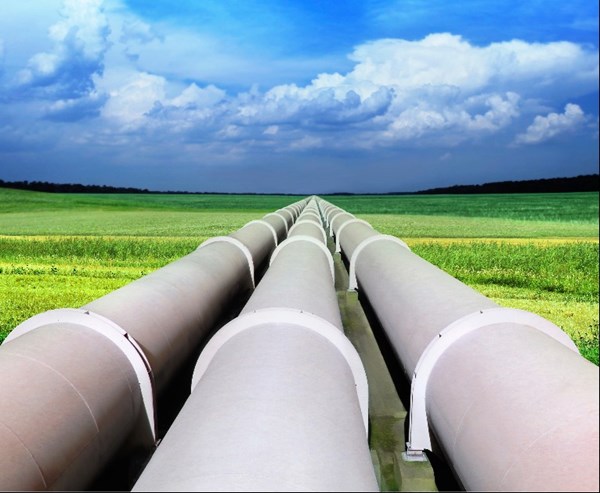Ukrtransgaz: Ukraine Imports more Gas from Europe than from Russia
As of the end of 2015, Ukraine had imported more gas from the European Union throughout the year than it has from Russia. The press center of the Public Joint Stock Company, Ukrtransgaz (a subsidiary of Naftogaz Ukraine) reported on January 6, 2016, that, "Ukraine has received 10.3 billion cubic meters of gas from European sources."
"Most of the natural gas, 9.7 billion cubic meters, was imported through the ‘Slovak corridor’... while 6.1 billion cubic meters was imported from Russia to meet the needs of domestic consumers," Ukrtransgaz stated in a press release.
In addition, Ukrtransgaz provided numbers on the amount of ‘blue fuel’ imported by Ukraine in 2014, when Russian gas imports exceeded European ones, "In 2014, Ukraine imported 14.5 billion cubic meters of Russian gas and 5.1 billion cubic meters from the European Union."
A significant increase in the volume of gas imported from the European Union in 2015 reduces the possibility of a new ‘gas war’ between Russia and Ukraine, according to the program manager of the Analytical Center Dixy Group, Roman Nitsovich.
"The commercial component, I think, is not a major factor in this matter. We have diversified the supply of hydrocarbons, strengthened our position in negotiations with other suppliers of gas as well as with Russia. We are also building strong arguments to defend our case in the Stockholm Arbitration regarding gas contracts with Russia signed in January 2009," said Roman Nitsovich in a commentary given to the Russian branch of The Voice of America.
Nitsovich believes that the successful diversification of gas supplies is the result of the good work done by Ukrainian negotiators in 2015 and that it allows Ukrainians to hope that "Russia will not be able to use gas as a weapon in the possible new 'gas-transit wars.'''
"Gas has always been more than just an economic argument in relations between Ukraine and Russia. The diversification of supplies from the European Union will, in fact, eliminate the Kremlin’s ability to continue to use this weapon, "said Roman Nitsovich.
The Co-Chairman of the Fund of Energy Policies, Dmitry Marunych, believes that the whole concept of the ‘gas war’ in Ukrainian-Russian history often occurred as a consequence of political conflicts. Moreover, often it appeared amidst the Ukrainian political establishment, the expert said.
"I would not be too quick to declare the ‘gas war’ as a thing of the past. Disruptions in deliveries and the lack of future agreements are all still possible, though the impact of these measures will not be so serious since Ukraine receives European gas regularly. But you cannot say that, for example, in 2009 it was impossible for Gazprom and Naftogaz to reach an agreement during the negotiations. It's just that the responsibility for that episode of the ‘gas wars’ lies on the former leaders of the country; who, by fighting out their disagreements, have jeopardized the functioning economy of the state. I don't see any reason why we couldn't have signed a contract before December 31, 2009," said Marunych to the Russian branch of The Voice of America.
At the same time, the expert notes that the results of the previous few years of negotiations in the field of reverse gas supplies from the EU has influenced the current price of Russian gas for Ukraine.
"Yes, the competition should lead to lower gas prices, both from Europe and from Russia, however, this doesn't mean that in this case effective negotiations with Naftogaz and Gazprom were impossible," Marunych emphasized.
According to Marunych, the reasons for the power struggle between Kiev and Moscow in 2006 and 2009 lies in the sphere of political and legal differences between the parties. These struggles caused much concern in the European Union regarding the uninterrupted transit of Russian fuel, according to Marunych.
The diversification of gas supplies to Ukraine is one of the main conditions to ensuring the energy security of the country, according to the Executive Director of the Center for Social Studies, Sofia Vladimir Lupatsy.
"It's necessary to ensure that that no one supplier has a monopoly on fuel prices. In a more global dimension the diversification of supplies for Ukraine also becomes necessary to the energy security of Europe. This also takes into account the methods of Russian gas transit to the EU, whether Ukraine will remain as a major transit country for Russian gas and what workarounds there will be. I think that at this point in the European Union there is no simple answer to this question," Vladimir-Lupatsy stressed.
Vladimir-Lupatsy believes that the issue of how to transport Russian gas to the European Union is on the agenda for the energy talks in Brussels, Moscow and Kiev.
"In the context of bilateral cooperation between Ukraine and the EU the negotiations are not confined to the issue of gas supplies. Europeans are interested in Ukraine becoming a full member of the European Energy Community, so that we could become a member of the European gas market, and allow for the so-called ‘gas frontier’ of the EU to be pushed from the western Ukrainian border further east - to the border of Ukraine and Russia," Vladimir-Lupatsy said.
The expert believes that the decline in gas prices for Ukraine coupled with intelligent energy policies could lead to a decrease in the energy dependency of the Ukrainian GDP.
